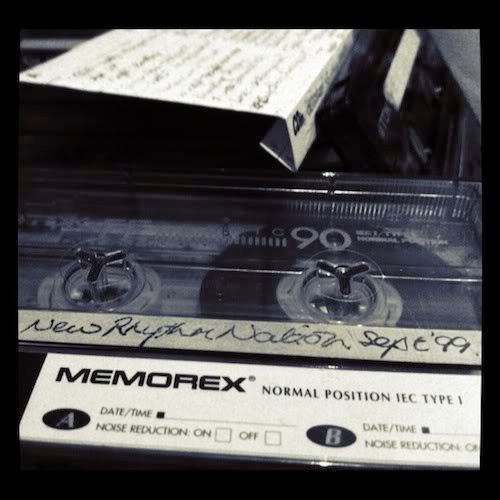"Instant Pop" To Beat Piracy (AKA Finally Starting To Meet Demand)

An article written in The Guardian this Sunday left a strange taste in my mouth, and after doing some digging pretty much every other publication I've seen has "reported" the story/ regurgitated the press release in the same way (please will someone remind me of the difference between blogging and journalism again?).
The general premise is that "Wait is not a word in the vocabulary of the current generation", that "Piracy remains a crippling problem for the British music business", and that "Britain's two biggest record labels will finally try to play their part in stopping it".
I personally would like to say to that, bullshit. Below is Exhibit A, a cassette tape (yep, that's what that plastic thing is kids!) I recorded of Trevor Nelson's Rhythm Nation show on Radio 1 in 1999. My average weekend involved waiting for Trev to come on, recording his show (you couldn't leave because you had to turn the tape over), then painstakingly writing down the tracklist and six weeks later trying desperately to order in a few singles or albums from HMV in Brighton "LL Cool Who?". Is ripping a song that's not out for another six weeks off of Youtube any different?

The iPod and iTunes store launched in 2001, and yet we're in 2011 and the process for selling music hasn't changed - 6 weeks of radio play to "build anticipation", then a single or two, follow up with the album. Just writing that makes me laugh. I wonder at times how many people at the top of major labels are actually music fans. If you are a music fan you search for a song because you can't get it out of your head and you really want to listen to it - not because you're a terrible and impatient person. Some people won't pay for music regardless, but it has been proven that the majority of free downloaders are also the biggest paying customers - because they are the biggest consumers of music.
The question is not so much one of stealing, but one of supply and demand. If I search for "Jessie J Do It Like A Dude", currently at Number 2 in the charts and all over the press release as an example of the new "on air, on sale" policy, what comes up on the front page is lots of videos and press - not an iTunes or Amazon link. I then click on her Youtube video where there is a link to buy the single, but that's an extra step in the chain and I've already sated my appetite. 79p is often the price consumers will pay for convenience and to save time searching online (not just because we are morally compelled to support an artist), in the same way we might pay 79p more for a Starbucks inside a train station than at the lovely local coffee shop 5 minutes down the road (even though we all know what sadly happens to many of them). Unless music retailers can better compete with Youtube as a music search engine they will still fail to truly compete even with this new release strategy (though its worth mentioning they do receive some revenue from online streaming).
The most worrying thing is the amount of pressure this "on air, on sale" strategy could put on radio playlists, which virtually dictate the singles chart. Great news if you can afford a radio plugger and a big campaign, good luck if you can't. Interestingly, the idea has been floated to create a broader range of charts to incorporate streaming or something like the new Billboard Social 50. It would be interesting to see the difference between a playlist created by committee (Radio 1) and one created by listeners (e.g. Last FM). This week the Last FM top 10 includes Florence and The Machine, Daft Punk, The xx and Arcade Fire, none of whom are in the R1 singles chart or A-Playlist.
The generally underexposed other side of the story is that more units of music are being bought, more music and music of a wider range is being listened to, and more musicians have professional careers than ever before - the music industry (or perhaps major labels) are not so much being "ravaged" as generally doing a very bad job of adjusting to the market whilst blaming some of their biggest customers for not remaining in the past with them.
